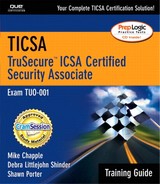Types of Computer Crime
Identify, specify, or describe computer and network ethical, legal, and privacy issues.
Computer crimes can be categorized in several different ways, because there are a number of ways in which computers can be involved in criminal behavior.
The computer is used to commit the crime (a “tool of the crime”) in the same way a set of lockpicks is used to commit a burglary.
The computer is the target (the “victim”) of the crime.
The computer is used to keep records (such as a list of customers by a bookie or drug dealer) or for other purposes that are less directly related to the crime.
Computer security specialists are most concerned with the first two categories, and most especially the second. Most often, the specialist's job is to protect computers and networks from becoming the target of criminals and to aid in investigation when an organization's computer systems do become victimized.
Common computer crimes in this category include
Unauthorized access or interception and theft of data. “Hacking” into a network from the outside, or gaining onsite access, to obtain information without permission of the owners (theft of data can be further broken down into more specific categories, such as identity theft, corporate espionage, embezzlement, plagiarism, theft of trade secrets, and so forth)
Destruction of data. Erasing or changing data files, either manually or by introducing viruses, scripts, or other malicious code into the system
Damage to system integrity. Erasing or changing key operating system or application files or introducing code that causes the system to crash or not perform as it should
Denial of service. Overloading a system or network so that it crashes or is so congested that legitimate users can't gain access
Other computer crimes that may concern security specialists include software piracy, child pornography, and other illegal uses of the network.
Some actions fall within a “gray area” of the law. For example, hackers often argue that using excess CPU cycles on someone else's computer shouldn't be considered a crime—and it may not be, depending upon the jurisdiction. Some states' (and countries') statutes are written in such a way that any attack that doesn't involve actually accessing the data on the network isn't a criminal act. Other jurisdictions have written their laws broadly enough to cover any use of a network or system without authorization.
